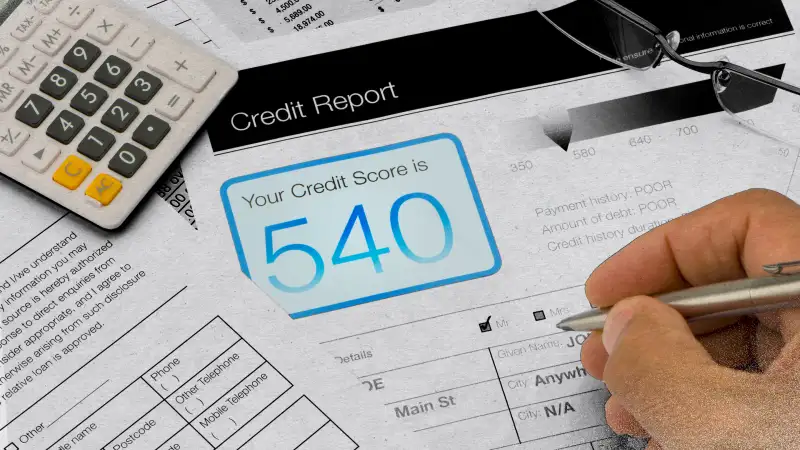How to Remove a Charge-off from Your Credit Report

Future lenders want to know that the person they are extending credit to is willing and able to pay back their debt obligations. However, the presence of a charged-off account can be a huge red flag for potential creditors.
In fact, charge-off accounts can affect your creditworthiness to the extent that you may not get approved for the loan you are seeking, or if you are approved, you don’t get the best terms possible. Subprime loan terms can cost you thousands over the life of a loan due to having higher interest rates.
If you want to avoid the damage a charge-off account can cause to your credit, consider taking steps to remove it. Although there’s no guarantee you’ll get the exact results you expect, it can be worthwhile to attempt removal. Here’s what you need to know about removing charge-offs from your credit report.
Table of Contents
- Check your credit report for charge-off counts
- Put together the details of the debt
- If the charge-off is inaccurate, inform the credit bureaus of the error
- If the debt is accurate and unpaid, try paying it off
- If you can’t pay the full amount, negotiate a pay-for-delete agreement
- Get everything in writing
- Hire a credit repair company if you need help
How to remove a charge-off from your credit report
Check your credit report for charge-off accounts
The first thing you’ll want to do is understand the entirety of your potential charge-off account. So, the first thing you’ll do is check your credit report. You can get access to your free credit report online each year at annualcreditreport.com, from each credit reporting agency (CRA): TransUnion, Equifax and Experian.
From here, learn how to read your credit report and find the information you need about your charged-off accounts. The details you are looking for could be in the “credit history and accounts” section, where you can find information on missed or late payments and get a better handle on your outstanding debt and collection accounts.
Next, take a look at the “negative information” or “public records” section. Here you’ll find every negative items that can lower your credit score, such as bankruptcies, foreclosures, charge-offs, delinquent payments or repossessions.
Before responding to a debt collection, check the statute of limitations in your state.
It’s important to go through this information for accuracy. If you find anything reported incorrectly with the credit reporting agencies, you can take steps to update or remove the information (which we’ll discuss below).
Put together the details of the debt
After you’ve learned how to get a credit report and done some sleuthing, it’s time to gather and confirm all the details of the past due debt. This step is especially important because if something isn’t correct, you have some disputing rights that could provide some relief ranging from reducing your debt to removing the charge-off from your credit or even updating your credit report with more favorable information regarding the negative account.
Here are the details you need to check:
- Account number: This is the account number with the original creditor.
- Original creditor name: The company that originally billed you for the product or services
- Open date: When you first opened your account with the original creditor
- Charge-off date: When the original creditor deems your debt uncollectible and writes it off their books
- Payment history: A record of when you made or missed payments along with when your account was last active
- Borrower names: Whose name is attached to the debt
- Balance: How much is owed
Pay special attention to things like the dates, the amount owed and the type of debt. For instance, collection agencies may report the date they purchased your delinquent account as the date the account was last active rather than the date the original lender or creditor charged off the account. This practice can actually prolong the time frame during which this debt affects your credit score, as older charge-offs affect your credit less as time passes.
You should also check the account balance for additional fees tacked on to the original debt that should not be there. Although you may be responsible for late fees, penalties or interest, it should line up with a stated fee schedule from the original creditor. In essence, there are no bogus fees added to your account balance.
Finally, make sure you recognize the name of the original creditor and the name of the debt is attached to you as well. It’s not uncommon for creditors to mix up people with the same or similar names with one another along with their debt.
If the charge-off is inaccurate, inform the credit bureaus of the error
Supposing you find erroneous information regarding the account, you now have a right to dispute the charge-off. Federal law allows you to initiate a dispute with the credit bureaus’ reporting information you believe to be inaccurate.
You should be prepared to supply supporting documentation that backs your claim regarding the erroneous charge-off. This might include original invoices, account statements, contracts, etc. Any document that proves your case may help the credit bureau negate (or verify) the validity of the debt.
Once you submit this information, the credit bureau has to investigate your claim. If there is an error, they must correct or remove the charge-off in compliance with the Fair Credit Reporting Act. You can also submit a dispute with the furnisher (original creditor), too. In either case, both entities must generally conclude their research and decision about the charge-off account within 30 days.
If the debt is accurate and unpaid, try paying it off
A valid charge-off account that remains on your credit report can result in a bad credit score. A paid charge-off won’t have as much of a negative impact. And some credit scoring models, like VantageScore, don’t penalize a consumer's score as much for older or paid-off charge-off accounts.
You can pay the full balance all at once or in installments. Another option would be to settle for a lower amount. Paying the account in full looks better on your credit report than settling, but doing something about a charge-off is better than keeping an unpaid charge-off on your credit.
If you can’t pay the full amount, negotiate a pay-for-delete agreement
It is possible to negotiate a pay-for-delete arrangement for your charged-off account. With pay-for-delete, you pay all or a portion of the debt in exchange for the charge-off information being removed from your credit.
Creditors are under no obligation to do this, but at times it can work. If you successfully negotiate this arrangement, you should also get this agreement in writing. This is especially helpful if the party you are dealing with neglects to communicate with CRAs to remove the account. With a letter in hand, you can contact the credit bureaus yourself to ensure they make those updates, as authorized by the creditor or collection agency.
Get everything in writing
If you make a payment arrangement or negotiate a pay-for-delete, get all the terms in writing—the more specific the better. Your agreement should be on official company letterhead and capture your agreement accurately. Once you get the details in writing, verify that everything is accurate. If not, ask for an update based on what you discussed with whoever is responsible for carrying the agreement out.
If some time passes and you still haven’t reviewed a letter from the creditor, CRA or debt collection agency, you should reach out to them. Be persistent until you get the agreement in writing articulated according to the deal you negotiated.
Hire a credit repair company if you need help
Credit repair companies like Lexington Law or Credit Saint can come in handy for removing charge-offs from your credit report. However, it isn’t the cheapest option out there — so prepare to budget accordingly.
Although even the best credit repair companies will pretty much do the same thing you can, they may get things done quicker and potentially get better results. These professionals may also have insight into other personal finance strategies that may boost your credit score even more.
The key to working with a credit repair company is proper vetting. Ensure that you’re dealing with a reputable service that uses effective, non-fraudulent ways to remove charge-offs from your credit report.
Check sites like the Better Business Bureau, Trustpilot, the Consumer Financial Protection Bureau (CFPB) or Google Reviews to ensure the company doesn’t engage in unethical, shady practices around credit repair.
How to Remove Charge-Offs from Your Credit Report FAQ
What is a charge-off?
A charged-off account is one that your original creditor deems as uncollectible and is written off from their books. Say you've fallen behind on your credit card payments and have accumulated a substantial amount of credit card debt. If your credit card issuer determined you're delinquent, (you haven't made a payment in 180 days), they can then write it off as bad debt.
Once an account is charged-off, the creditor reports it to the CRAs, which update your credit files. Then, usually, the original creditor will sell this account to a third-party debt collector, which will then contact you to pursue the charged-off debt.
How do charge-offs affect your credit?
How long does a charge-off stay on your credit report?
Can you remove a charge-off without paying?
What can you do if you can't remove the charge-off?
Summary of Money’s guide for removing charge-offs from your credit report
- First, check your credit report for any charge-offs and put together the details of the debt
- If the debt is inaccurate, dispute it with the credit bureaus
- If the debt is accurate, you can either attempt to pay it off or negotiate a pay-for-delete agreement
- In any case, make sure to get everything in writing
- Hiring a credit repair company can take a lot of the work off your hands, though you will have to pay for the service

